Stay ahead of the curve as a political insider with deep policy analysis, daily briefings and policy-shaping tools.
Request a DemoMeet our inaugural Georgia Power 50…

U.S.. Rep. Andrew Clyde, left, Gov. Brian Kemp and Rev. Bernice King. (Credit: Andrew Clyde, Office of Gov. Kemp and Andrew Harnik)
EDITOR’S NOTE: As Georgia stands at the crossroads of political influence and policy direction, State Affairs proudly presents its inaugural Georgia Power 50 list, illuminating the individuals whose leadership shapes the state’s trajectory. From the bustling halls of the Capitol in Atlanta to the corridors of power in Washington, D.C., these titans of governance, policymaking, business and economic development represent the pinnacle of influence in Georgia’s political landscape. Join us as we unveil the 50 most powerful and influential figures whose actions reverberate throughout the Peach State and beyond.
Welcome to State Affairs’ inaugural Georgia Power 50.
This list includes lawmakers, government leaders and other top state decisionmakers who are likely to shape politics and policy and determine Georgia’s path forward during the rest of 2024 and beyond.
Although this is not a definitive list of today’s impactful and influential Georgia leaders, it includes people who are actively setting the political agenda in our state. We hope this list stimulates thought and conversation about Georgia’s future. We invite your feedback on these and other power players in our state.
STATE AFFAIRS’ INAUGURAL “GEORGIA POWER 50” LIST
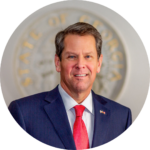
- Gov. Brian Kemp wields significant influence as the state’s chief executive, holding the power to shape policy decisions, allocate resources and set the tone for governance. Kemp’s influence extends beyond the Peach State. A key figure within the Republican Party, Kemp makes decisions and takes actions that resonate with not only Georgians but also political stakeholders across the nation. His handling of high-profile issues such as health care, education, economic development and voting rights significantly impacts millions of Georgians’ lives and sets the agenda for state-level debates and initiatives. In April 2020, less than a month after states began emergency shutdowns in response to the COVID-19 pandemic, Kemp defied the trend and reopened Georgia for business. The “Kemp Way” has also led to Georgia retaining its ranking as the No. 1 state to do business for the 10th consecutive year. This coming year, Kemp, whose recent State of the State remarks critiquing dysfunction in Washington have sparked rumors he may seek national office after his second term ends, is the 2024 vice chairman of the Republican Governors Association, meaning additional influence nationally.

- Rep. Jon Burns, speaker of the state House of Representatives, was elected to the post in 2023 after serving in the House since 2005 and as majority leader since 2015. The Effingham Republican took over from his longtime ally and mentor Speaker David Ralston, who died unexpectedly in November 2022. Exercising major influence over the House agenda, Burns presides over House floor sessions, appoints committee chairs, assigns bills to committees and calls matters before the House for debate. Heading into the election cycle, Burns has announced cuts to income and property taxes and called for changes to election processes, including the elimination of computer-generated codes on ballots, and removing the secretary of state’s office from the state election board.
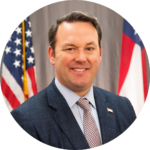
- Lt. Gov. Burt Jones presides over the day-to-day proceedings of the state Senate. Shepherding legislation and debates over state policy has propelled Jones into a position of influence. The Jackson Republican chairs the Senate Committee on Assignments, which designates senators to various committees. His high-profile stature has allowed him to push key priorities and legislation out front. Just this week, Jones’ influence was on display when the Senate passed Senate Bill 426 despite Kemp’s declaration at the start of the year that he would not push for comprehensive tort reform this session. Jones, who faced scrutiny — and who could face criminal charges — for acting as a Trump elector in the 2020 election, is also immersed in his family’s 56-year-old business, Jones Petroleum, which has amassed a portfolio that includes Piggly Wiggly supermarkets, Marathon and Valero convenience stores, shopping centers and 50 fast-food locations in Georgia and Alabama.

- U.S. Sen. Raphael Warnock oversees arguably one of the most influential Black churches in America — Ebenezer Baptist Church in Atlanta — and is the first Black U.S. senator from Georgia. He has been a leader in the campaign to expand Medicaid in Georgia, helped increase the state’s voter registration and helped build a powerful voting coalition that played a role in putting Joe Biden in the White House. Warnock, author of a book about his life, commands crowds wherever he goes and is among the most highly sought-after speakers in Congress. Warnock serves on the Banking, Housing and Urban Affairs Committee; the Committee on Commerce, Science and Transportation; and the powerful Agriculture, Nutrition and Forestry Committee. Last December, he and Sen. Jon Ossoff announced three federal grants that will help create three new passenger rail corridors linking cities across Georgia and other major Southeastern cities.
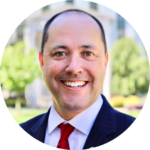
- Attorney General Chris Carr has taken a tough stance against gangs and drug and human trafficking since he was appointed by Gov. Nathan Deal in 2016. He built multi-agency task forces to crack down on criminals while advocating for tougher sentencing laws, and he joined a multistate class-action case against opioid drug manufacturers that has resulted in more than $600 million in settlement funds allotted to fund treatment, prevention and recovery services for opioid addiction in Georgia. Carr has also represented the state in lawsuits to enforce Georgia’s strict abortion law and led election integrity cases defending Gov. Kemp’s win over Stacey Abrams in 2018 and the unfounded election fraud claims of Trump and his supporters in 2020. A key partner in executing the public safety agendas of two governors — Deal and Kemp — and a former chief of staff to U.S. Sen. Johnny Isakson, Carr has told supporters he’ll run for governor in 2026 and has begun to amass a campaign war chest.
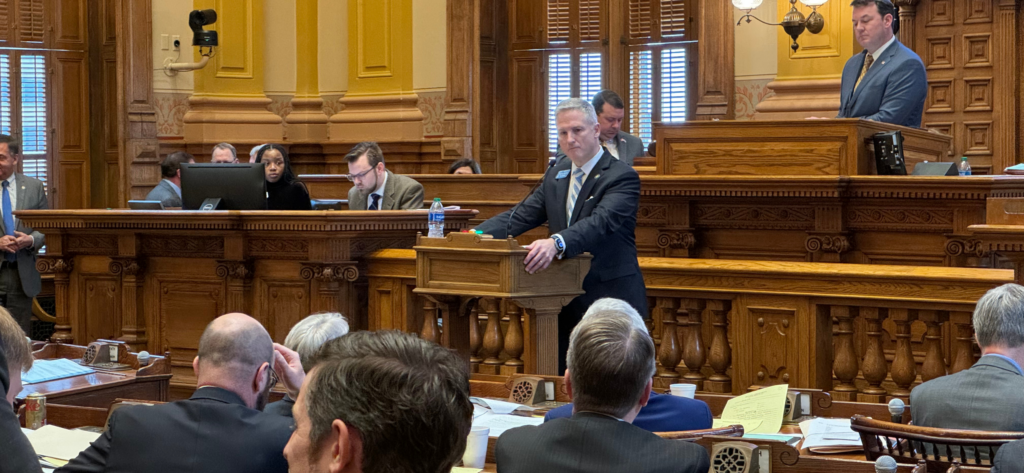
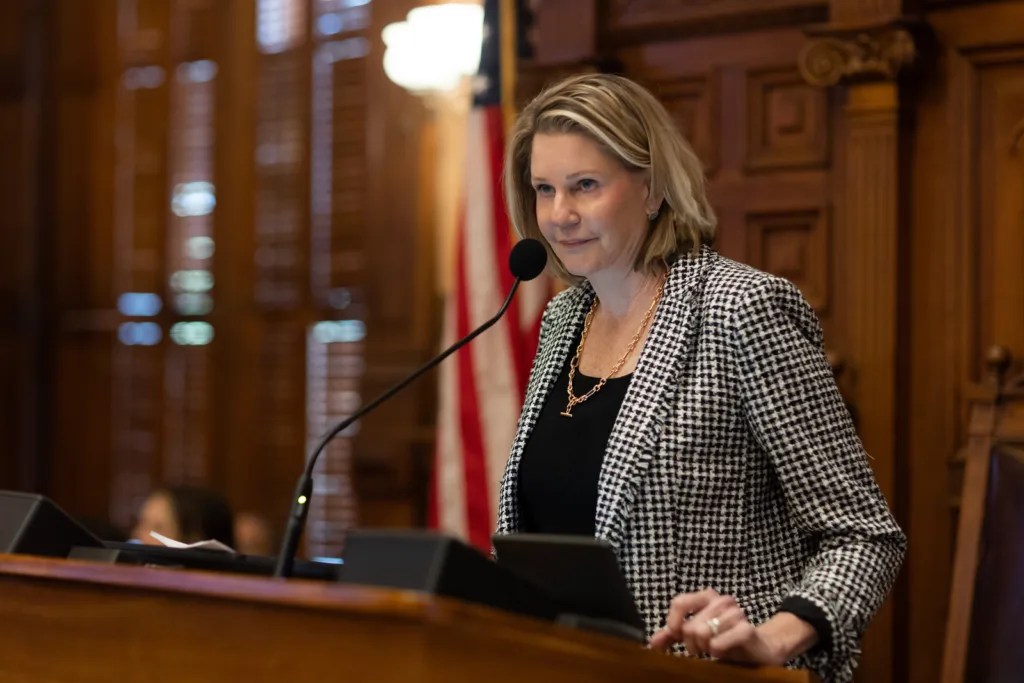
- Sen. John F. Kennedy serves as the Senate president pro tempore. Aside from his famous name, the Republican is second-in-command in the Senate and oversees the body’s administrative affairs. In January, Kennedy co-sponsored the controversial Senate Bill 390, proposing to ban government money for Georgia libraries with ties to the American Library Association, which some lawmakers claim is influenced by Marxist beliefs. Since his election to the Georgia Senate in 2014, he has served as former Gov. Nathan Deal’s floor leader and majority caucus chairman.
- Rep. Jan Jones, House speaker pro tem, has served in the second-most powerful position in the House since 2010. She made history as the state’s first female speaker of the House, a role she assumed for two months after former Speaker David Ralston died in November 2022, demonstrating a steady hand as House leader in the run-up to a new two-year legislative session. Considered a no-nonsense and pragmatic conservative by her House colleagues, Jones has become a policy leader on education issues, authoring bills to create the state charter schools commission and a law to let high school students enroll in college or tech schools as juniors. Over the past year, she has led an effort to shore up pre-K education and won the backing of House Speaker Jon Burns for an ambitious $100 million proposal to overhaul pre-K classrooms and boost teacher salaries. Serving on the House redistricting committee, she’s helped redraw electoral districts in ways that benefit Republicans, in 2021 as well as last November, when she staunchly defended the Republican majority’s plans for state and congressional districts, which a federal judge upheld. She has joined other Republican leaders in the General Assembly to change election law — advocating for successful bills to limit early voting, absentee ballots and drop boxes — and to implement more security measures on voting system equipment.

- Sen. Steve Gooch, Senate majority leader, is on all the right committees that determine where bills are assigned and how money is spent, and he keeps tabs on whether the Senate, government entities, public officials and elections are operating ethically. Often seen as a peace-broker between divided factions in his party, the veteran lawmaker has earned his peers’ respect, having served as the majority leader of the Senate Majority Caucus in 2022. Before that, Gooch served as the Senate majority whip and chair of the Senate Transportation Committee. He has long been a champion of issues such as transportation and infrastructure. He has worked to provide public-private partnership opportunities to state and local agencies creating more affordable mechanisms to decrease the taxpayer burden for projects. He also led efforts to improve connectivity throughout Georgia for broadband expansion and small-cell wireless broadband deployment that has led to hundreds of millions of federal and state funds for rural broadband.

- Rep. Chuck Efstration was elected House majority leader by his GOP peers in 2022 after a decade of service in the House, where he has chaired the Judiciary Committee and campaigned for law-and-order legislation. A former assistant DA and felony prosecutor, Efstration sponsored a bill to let the state attorney general prosecute criminal gang activity in jurisdictions across the state and other bills to crack down on gangs and rioters. After Ahmaud Arbery’s racially tinged murder in 2020, he co-sponsored a bipartisan hate crimes law. As majority leader he has supported the GOP’s measures to reduce taxes, create a prosecutorial oversight commission, impose cash bail on more crimes, implement school vouchers, expand mental health parity reform and promote Gov. Kemp’s budget priorities.

- Brad Raffensperger, the secretary of state, likely has one of the most recognizable political names in the nation. Not only has he stood up to a sitting president over election issues, but Raffensperger has also taken it on the chin from Georgia GOP peers who’ve chipped away at his power as state elections czar. But Raffensperger isn’t having it. He has stood tall against opposition and death threats, shepherding Georgia’s controversial election reform law known as SB 202 into place in 2022. He has also since called on state lawmakers to increase fines and jail time for people who attempt to hack into or take possession of any election equipment. Raffensperger has repeatedly insisted no widespread fraud or tampering with election equipment has occurred during any recent elections and held firm that any wholesale changes to the state’s voting systems will have to wait until 2025.

- Georgia Supreme Court Chief Justice Michael P. Boggs’ peers elected him to head one of the busiest state supreme courts in the nation at one of the most challenging times for Georgia’s judicial system. Boggs assumed the role while the country was grappling with the effects of COVID-19, which led to tremendous backlogs of court cases that Georgia’s judicial system is still dealing with. He recently told lawmakers that state courts have made significant progress in reducing case backlogs but that security and shortages of judicial professionals remain a problem. Boggs is a strong proponent of alternative justice avenues for people with mental health and addiction issues. He’s a member of Gov. Kemp’s Behavioral Health Reform and Innovation Commission, where he leads the Mental Health Courts and Corrections subcommittee and has helped lead the expansion of such accountability courts in Georgia.

- Rep. Matt Hatchett chairs the powerful House Appropriations Committee, which plays a key role in writing the state’s $37.5 billion budget and determines how much money goes to schools, colleges, hospitals, roads, law enforcement and social services each year. The former majority whip and caucus chair took over from longtime appropriations chair Terry England when he retired in 2022. Hatchett is also director of development for the Mercer University School of Medicine.

- Sen. Blake Tillery, chair of the Senate Appropriations Committee, runs the Senate’s budget writing team that ultimately determines how and where the state’s money should be spent from the Senate perspective. A rising star in the state Republican Party, Tillery was named a Georgia Trend “40 Under 40” honoree in 2013 and is a member of the Conservative Policy Leadership Institute and a graduate of Republican Leadership for Georgia. Though Kemp decided to put the brakes on tort reform this year, Tillery plowed ahead in the Senate, sponsoring SB 426, a bill that limits people’s ability to sue insurance companies directly in lawsuits involving trucking accidents instead of suing the trucking company or driver involved. The bill, a top priority of Lt. Gov. (and Senate President) Burt Jones, is intended to limit “runaway jury” awards and stabilize insurance rates for commercial truck drivers. Tillery is also vice chair of the State Institutions and Property Committee and the Government Oversight Committee, secretary of the Retirement Committee, a member of the Reapportionment and Redistricting Committee and ex-officio member of the Finance Committee.
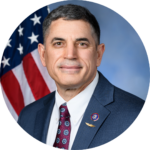
14. U.S. Rep. Andrew Clyde, who sits on the Appropriations Committee, is a member of the far-right House Freedom Caucus, which led the push to oust House Speaker Kevin McCarthy and wields strong influence over spending bills. Clyde wants to prohibit federal funding for prosecuting any major presidential candidate before the election and funding state prosecutions in general. A Trump loyalist, he voted to overturn the 2020 electoral results and called the Jan. 6 riot “a normal tourist visit.” He has angled to eliminate the 1973 law allowing home rule for D.C. and abolish the district’s mayoral office, a campaign that picked up steam last fall and ruffled feathers in Washington but is unlikely to survive a Senate filibuster.

15. Marty Kemp, Gov. Brian Kemp’s wife and the first lady of Georgia, leads initiatives and pushes for passage of legislation that fights human trafficking and supports young victims of sex trafficking. As the daughter of the late former Rep. Bob Argo, Marty Kemp has politics in her DNA. She has the ear of many influential Georgians. The University of Georgia grad and small-business owner is pursuing priorities she believes are integral to creating a better Georgia, such as the Georgians for Refuge, Action, Compassion and Education (GRACE) Commission, designed to fight the threat of human trafficking in Georgia. She is a regular fixture at major announcements from her husband, who often (unsurprisingly) calls her the “Best First Lady in America.”

- U.S. Sen. Jon Ossoff, the first Jewish senator from Georgia, likes to tout his role in the rollout of bipartisan legislation passed by Congress, including the Inflation Reduction Act, which has brought more than $18 billion in investments in clean energy projects to Georgia, and the infrastructure law that he and Sen. Raphael Warnock have leveraged to funnel funding for transportation projects across the state. Among them are new construction on the Atlanta BeltLine, upgrades to roads and bridges, improved pedestrian and bike safety projects, and planning grants for high-speed rail between Atlanta and Savannah. A member of the Senate Judiciary and Homeland Security committees, Ossoff has led investigations into the state foster care system and federal prisons in Georgia, including sexual assaults of female inmates and medical treatment of inmates in immigration detention facilities. He also sponsored a law that requires cameras in federal prisons. In the current legislative session, the former investigative journalist has introduced bills to prevent child trafficking and opioid trafficking, upgrade military facilities, provide mental health support for veterans and support farm operations in Georgia, including aid to citrus growers.

- Jim Kennedy, chairman emeritus of Cox Enterprises and chairman of the James M. Cox Foundation, is the patriarch of the eighth-richest family in America. He has guided his family’s 126-year-old, $22 billion global media conglomerate through the ebb and flow of America’s business cycles. So when he talks, people listen. The family has long had an influential role in national and state politics, donating millions of dollars over the years to Democratic and Republican causes. Kennedy’s grandfather and the company’s founder, James M. Cox, was a Democrat who was governor of Ohio and a former presidential candidate. The Atlanta-based company owns The Atlanta Journal-Constitution, Autotrader, Kelley Blue Book and various cable and broadband services.
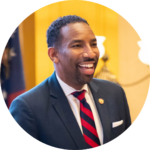
- Andre Dickens, Atlanta’s 61st mayor, assumes the chairmanship of the Atlanta Regional Commission this year, becoming the first Atlanta mayor to head the powerful regional planning and intergovernmental coordination agency. As mayor, he has begun to deliver on his goal of creating 20,000 affordable housing units by 2030, with 3,500 units built and 8,000 more underway since he took office in 2022. In January he signed an executive order to spend $4.6 million to help the city’s homeless population by expanding shelter services and building rapid housing out of shipping containers. Though episodes of violent crime and gang activity have plagued his tenure, in 2023 Atlanta saw a 21% drop in homicides and 15% fewer crimes against people. Dickens has come under fire for his push to build the Atlanta Public Safety Training Center, commonly known as “Cop City,” the scene of numerous confrontations between protesters and law enforcement. Opponents say the compound will destroy 85 acres of woodland and disturb the community.

- Fred Ridley, chairman of the Augusta National Golf Club, has been caretaker-in-chief of the exclusive golf club since 2017. The club hosts the Masters Tournament every April. One of the world’s biggest and most exclusive sporting events, the Masters Tournament boasts the second hardest ticket to get in sports, following the Super Bowl. And Ridley controls it all. The lawyer and amateur golfer maintains the Augusta National Way — in his own way. About a year after becoming chairman of the private and secretive organization, Ridley announced the creation of the Augusta National Women’s Amateur, with the inaugural championship taking place the week before the 2019 Masters.

- Fani Willis, the district attorney for Fulton County — encompassing much of Atlanta, the state’s capital and largest city — gained national and international attention as the lead prosecutor in the investigation into former President Donald Trump’s efforts to influence the 2020 presidential election results in Georgia. In February 2021, Willis initiated an investigation into a phone call between Trump and Georgia Secretary of State Brad Raffensperger, where Trump urged Raffensperger to “find” enough votes to overturn the election results. The conclusion to this rising legal star’s story has yet to be written — even as she heads to court to learn if she’ll continue to lead the county’s election interference case. Willis has been accused of benefiting from a romantic relationship with special prosecutor Nathan Wade, amounting to prosecutorial misconduct that accusers say should disqualify her from the Trump trial. Unlike other court cases against Trump, Georgia’s 98-page, 41-count indictment connects the dots of similar alleged criminal acts in other states and names names.

- U.S. Rep. Nikema Williams was chosen by state Democratic leaders, including then-Atlanta Mayor Keisha Lance Bottoms and two-time gubernatorial candidate Stacey Abrams, to take over the storied 5th Congressional District seat of civil rights icon John Lewis after his death in July 2020. She won the election handily that November. A state senator from 2017 to 2021, Williams is a longtime Democratic party organizer who since 2019 has served as chair of the state Democratic Party, the first Black woman to take on that role. She has vowed to carry on the fight for voting rights championed by Lewis and has co-sponsored legislation to restore elements of the Voting Rights Act as well as other bills to protect voters who move, to reduce wait times at polls and to ensure all workers get time off to vote. So far her election-related legislation has garnered support in the House but not in the Senate. Most recently, Williams has introduced legislation to create a $50 million fund managed by Black churches to address health care disparities and chronic health challenges among minority populations, and to establish a federal grant program for student entrepreneurs at historically Black colleges and universities. Meanwhile, in this big election year in Georgia, Williams and Democratic Party leadership are tasked with galvanizing more support for President Joe Biden, as well as local and statewide Democratic candidates, in a still-purple but Republican-leaning state.

22. Tyler Harper, agriculture commissioner, heads the nation’s oldest state agriculture department and Georgia’s No. 1 industry, with an economic impact of $75 billion-plus. Federal overreach and policies make it tough for farmers, producers and ultimately consumers, he told State Affairs last year. In his first 60 days in office, Harper made key hires, restored the agency’s law enforcement division and looked into the controversial soil amendment issue. The seventh-generation South Georgia farmer said he supports legislation this session to restrict adversarial foreign countries and their agents from buying Georgia farmland. Such a bill would be in line with dozens of other states that have limited or banned foreign countries from buying U.S. farmland. The Senate is set to consider a resolution to create a Senate Study Committee on the Preservation of Georgia’s Farmland. Harper has been mentioned as a possible gubernatorial candidate for 2026.

- Pat Wilson, the state’s economic development commissioner since 2016, leads a team that has landed some of the largest international corporate investment deals in state history for several years running, including the massive Rivian and Hyundai electric auto plants and dozens of other companies in the e-mobility and green tech sectors. In fiscal year 2023, the department won investments of more than $24 billion across 426 projects, committing employers to create 38,400 jobs, most of which will be located in communities outside of metro Atlanta. Wilson also courts and supports development and expansion of public-private partnerships focused on technological innovation and workforce development in the important agricultural, aerospace, tourism and entertainment industries, all of which have expanded exponentially over the past decade.

- Griff Lynch, president and CEO of Georgia Ports Authority, leads Georgia’s deepwater ports in Savannah and Brunswick — the Peach State’s gateway to the world. Wood pulp, paper, paperboard, food and clay are Georgia’s top five exports, while furniture, retail consumer goods, machinery, appliances and electronics are the state’s main imports. The 1,800-employee authority accounts for nearly 500,000 jobs through the state and contributes $29 billion in income and $122 billion in revenue. Savannah is the nation’s third-busiest gateway for container trade, and Brunswick is the second-busiest auto port complex. And Griff Lynch is at the helm of it all. The Maritime Association of the Port of New York-New Jersey, which inducted him into its International Maritime Hall of Fame last year, called Lynch “a proven leader in the maritime industry.”
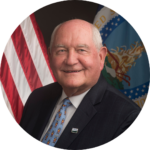
- Sonny Perdue, chancellor of the University System of Georgia, was appointed by the Board of Regents in 2022. As chancellor, he oversees 26 public colleges and universities, 48,000 faculty, 330,000 students and a $10 billion budget. About $3.3 billion of that comes from state general funds. Georgia’s governor from 2003 to 2011, Perdue haggled over $66 million in state funds for teaching expenses that Gov. Kemp vetoed in the 2024 budget last year but restored in his midyear budget this year. Kemp, the House and the Board of Regents also approved funding for a $50 million medical school at the University of Georgia, which will become the second public med school in the state if approved by the Senate, as expected. Perdue said the new medical school will help address the chronic shortage of physicians in Georgia.

- U.S. Rep. Marjorie Taylor Greene. Say what you will about the far-right, two-term congresswoman, but she’s making a name for herself — even if it’s cloaked in controversy. The pro-Trump politician was the top fundraiser in Georgia’s congressional delegation last year. Meanwhile, a survey of U.S. adults last June showed 11% of respondents had very favorable opinions of the congresswoman, while 35% had very unfavorable opinions of her. MTG — as she’s also known — is such an enigma that she was ousted last July from the U.S. House Freedom Caucus, an ultraconservative group. Taylor Greene has come under fire for baseless conspiracy theories and incendiary remarks viewed as racist and anti-Semitic. When she was a freshman in Congress in 2021, the Democratic-controlled U.S. House of Representatives stripped Greene of committee assignments after her social media posts showed she was spreading dangerous and racist conspiracy theories. Greene has since had committee privileges restored. She was assigned in January 2023 to the House Committee on Homeland Security.

- Josh McKoon, chair of the Georgia Republican Party and former state senator, was picked to lead the party last summer, promising delegates at the GOP state convention that he’d unite Republicans and raise millions of dollars for 2024 candidates. That’s a tall order because the party in Georgia is split among loyal supporters of former president Trump who embrace his relentless brand of election denialism and those who support the more moderate views of Gov. Kemp, who dismisses such concerns as wrongheaded and in the rearview mirror. McKoon promotes the GOP’s positions on small government, anti-abortion laws, guns and civil liberties, and defends Trump’s legal claims and political stances, all of which recent polls indicate have energized more conservative and independent voters to support both Trump and the GOP.

- Mike Giles, president of the Georgia Poultry Federation. Which came first, the chicken or the egg? In Georgia, it doesn’t matter. Both commodities make poultry the leading sector in agriculture, Georgia’s No. 1 industry. In fact, in 1995, the state General Assembly declared Georgia the “Poultry Capital of the World.” As such, the Georgia Poultry Federation holds sway in the Peach State. And Giles, who has headed the federation since 2009, is the gatekeeper of the Gainesville-based federation. Take, for instance, Athens’ new 70,000-square-foot-plus Poultry Science building, now the home of the University of Georgia’s College of Agricultural and Environmental Sciences Department of Poultry Science. Industry leaders — including federation president emeritus Abit Massey — came together with donations, and Giles was instrumental in facilitating the donations. Furthermore, he has been a steward of this agricultural economic engine, an ambassador for Georgia and its farmers statewide and internationally with global partners and export.

- Arthur Blank, businessman and philanthropist, is one of Georgia’s most influential economic development leaders. The retired co-founder of Home Depot owns the Atlanta Falcons football and Atlanta United soccer franchises. His AMB Sports + Entertainment Group operates Mercedes-Benz Stadium in downtown Atlanta, which will host World Cup matches in 2026. As chairman of the Arthur M. Blank Family Foundation, he gives away nearly $100 million yearly to support causes including the environment, democracy, mental health and youth development. Blank has committed to giving away at least half his personal wealth to charity.

- The Atlanta World Cup Host Committee is bringing the biggest sporting event on the planet to Georgia: the 2026 FIFA World Cup. The event will be hosted in three countries — Canada, Mexico and the U.S. — and Atlanta is one of 11 U.S. cities that will host games and welcome hundreds of thousands of fans from around the world. Eight games will be played in Mercedes-Benz Stadium, including two knockout-round matches and a semifinal. The net economic impact for Atlanta is estimated at $415 million. It took a village to bring the game to Atlanta. The host committee includes MB Sports & Entertainment Group, the Atlanta Sports Council, Atlanta Convention & Visitors Bureau, City of Atlanta and the Georgia World Congress Center Authority.

- Kirby Smart, head coach of the University of Georgia Bulldogs football team. With a 10-year, $112.5 million contract that takes him through 2031, Smart is one of Georgia’s highest-paid state employees and the third-highest-paid college football coach in the nation. Just how influential is he? The first day of the 2023 legislative session, Georgia lawmakers ducked out early to fly to Los Angeles to see the Georgia Bulldogs play in the College Football Playoff National Championship. Along with building a powerhouse football dynasty, Smart has brought lots of talent and money to the Peach State, making him a go-to guy when it comes to putting Georgia out front.

- Sen. Matt Brass heads the Senate Rules Committee and as such holds a particularly influential role, presiding over the rules and order of business for the Senate. Part of the committee’s duties include setting the calendar for consideration of bills and resolutions presented on the Senate floor each day. The rules committees in both chambers play vital gatekeeping roles on Crossover Day and sine die, when legislators jockey frantically to get a flurry of bills considered on the floor before time runs out.
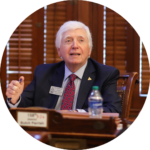
- Rep. Butch Parrish holds the powerful House Rules Committee chairman seat vacated with the death of Rep. Richard Smith on Jan. 30. The House Rules chair wields tremendous influence in determining what legislation gets to the House floor. In announcing Parrish’s appointment, House Speaker Jon Burns said, “Chairman Parrish has done an exceptional job representing his district [House District 158], fighting for our rural communities, and championing policies that lift up every Georgia family — including most recently with his work to improve healthcare across our state. Through his integrity, hard work, compassion and dedication to the interests of our state, he will also carry on the indelible legacy of Chairman Richard Smith — and I am confident that Chairman Parrish will serve the Georgia House and the people of our great state extremely well in this new role.”

- Rep. Shaw Blackmon, chair of the House Ways and Means Committee, holds sway over taxes, tariffs, and other revenue-raising measures in the state. All tax bills must start in House Ways and Means. In this role he also helps shape the revenue side of the budget. Blackmon has worked with Gov. Kemp to cut the state income tax progressively over the next several years, saving Georgia taxpayers about $3 billion. This year he joined Speaker Burns in introducing more tax bills to double the homestead exemption on property and raise the state income tax child credit to $4,000 from $3,000. Blackmon has supported hefty pay raises for teachers and law enforcement, as well as significant new investments in behavioral health and K-12 education. He’s also among lawmakers calling for creating new conditions for film companies to receive generous state tax credits, including hiring more Georgia workers and filming in rural Georgia.

- Sen. Chuck Hufstetler, chair of the Senate Finance Committee, has a fairly powerful role because the committee, much like Ways and Means, oversees Georgia’s taxing authority and revenue collection and deals with the financial services industry. Hufstetler is sponsoring SB 366, or the Tax Expenditures Transparency Act, which says all appropriations must be tied to a current or future revenue source. It passed the Senate and has traction in the House. Hufstetler also wants to limit tax credits for film companies and suspend tax credits for immense data centers run by companies like Microsoft that house thousands of computer servers but employ few people and heavily sap the power grid.

- James Earl “Jimmy” Carter Jr., former U.S. president and former Georgia governor, is among the most famous Georgians, putting his home state on the map not only in the United States but also abroad. As governor, he vowed to end racial discrimination and led an overhaul of state government, reducing its 65 agencies to 22. At the same time, he vastly increased the number of Black appointees to state boards and agencies. He carried that accomplishment with him to the White House, where he appointed more Blacks to cabinet positions than his predecessors and immediate successor, Ronald Reagan. Carter became a fixture in setting policies and working for peace globally. He brokered a peace pact between Israel and Egypt that still holds today. But after his 1977-1981 presidency, Carter cemented his legacy and influence with The Carter Center, which he co-founded in 1982 with his wife, Rosalynn Carter. The center’s mission has steadily expanded to include monitoring elections and eradicating diseases worldwide, and works to improve public health and human rights conditions at home and abroad. Although Carter, the longest-living president, entered hospice a year ago this week (Feb. 18, 2023), the mere mention of his name evokes respect for his service-minded spirit, power and influence in the halls of Georgia’s Capitol and still motivates everyday citizens to pick up a hammer for a Habitat for Humanity project.

- Sen. Kay Kirkpatrick is chair of the Senate Children and Families committee and a retired orthopedic surgeon. She is among the General Assembly’s busiest, and most influential, lawmakers. The Republican has passed several bills to help Georgians have better access to health care and more options and is often sought after for her vote on key issues. In addition to chairing Children and Families, Kirkpatrick is vice chair of the health and human services committee. She also serves on the appropriations committee, the insurance and labor committee and the veterans, military and homeland security committee.

- Gretchen Corbin, president and CEO of the Georgia Lottery Corp. since 2018, works to maximize revenues for the HOPE Scholarship and grants and pre-K programs for Georgia students. Corbin, the third highest-paid lottery executive in the nation, and her staff collected $26.5 billion in proceeds to support educational programs for over four million Georgians since 1993. The Lottery provides $1.2 billion in annual funding to education and has amassed $1.9 billion in reserves, which some lawmakers and educational advocates would like to see spent on more seats for pre-K students, need-based college aid, and other educational priorities. A former commissioner of the Technical College System of Georgia and the Georgia Department of Community Affairs, Corbin has spent her career in state government directing resources to communities, businesses and economic development projects. She helped develop the HOPE Career Grant to provide free tuition to students in high-demand career paths, an initiative that Gov. Kemp and other GOP leaders in the Legislature want to expand.

- Chris Clark, CEO of the Georgia Chamber of Commerce, heads the 47,000-member organization that promotes economic development and pro-business policies around the state, often at the invitation of state leaders. Clark also leads a team of lobbyists at the chamber’s political affairs arm who advocate for policies and investments related to the state’s skilled workforce and infrastructure. Clark said the chamber’s legislative focus this year will include passing occupational licensure reform to help more people, including those with criminal records, secure credentials and get to work, and tort reform to rein in “frivolous lawsuits” against Georgia businesses. Under Clark’s leadership, the chamber is pushing for lower state income and corporate taxes and making the state’s economic incentives, such as tax credits for the film industry, “more competitive, transparent and accountable.” The Republican-leaning chamber vets and supports a bipartisan slate of political candidates in every election cycle and will issue its much-coveted endorsements of statewide and district legislative candidates vying in 2024 races later this year. –

- Charles S. Bullock III, a political science professor at the University of Georgia School of Public and International Affairs, has been a fixture at the university for nearly 50 years. The political science guru has observed nine governors and 28 sessions of the Georgia General Assembly and has taught political science to multiple generations of students, including Pat Wilson, commissioner of the Georgia Department of Economic Development; Richard Dunn, director of the Governor’s Office of Planning and Budget; and Republican Sen. Colton Moore. Bullock is a walking encyclopedia and Google search engine when it comes to politics. He is America’s foremost authority on redistricting and a keen observer and prognosticator on the machinations of Southern politics and voting rights. During his career, Bullock has written or collaborated on 30 books and 150 articles and is considered the “Dean of Southern Politics.”

- Rep. Mesha Mainor became the only Black Republican lawmaker in the Statehouse after switching parties last July. Saying she was fed up with the Democrats’ rigid political agenda, Mainor was pushed over the edge by criticism of her support for a GOP-driven bill to provide $6,000 in school vouchers to allow students in failing school districts to attend private schools, as well as her “yes” vote for a prosecutorial oversight commission. The school voucher bill failed, but it catalyzed Mainor’s defection to the Republican Party, whose candidates have made steady inroads into capturing Black votes in Georgia in the past few election cycles. Though Black voters, who make up about 30% of the overall vote in Georgia, were key to Biden’s victory in 2020 and helped Democrats secure control of the U.S. Senate with the 2022 election of Sen. Raphael Warnock, Black turnout in Georgia in 2022 was about 8% less than in 2018. The GOP in Georgia hopes Mainor’s outspoken embrace of the party’s pro-school choice, tough-on-crime, pro-law enforcement agenda will help get priority bills passed and mobilize more conservative Black voters.

- Rep. James Beverly is the House minority leader and serves on several influential committees, including Rules, Appropriations and Health. The Macon Democrat has represented Middle Georgia in the House since 2011. An optometrist, Beverly often advocates for legislation that addresses health inequities, which this year includes Medicaid expansion (which has gained some traction among GOP members) and reducing maternal mortality among Black women. He is also leading the Democrats’ push to pass the Safe at Home Act, a bipartisan bill to protect tenants’ rights, which requires that rental properties are “fit for human habitation” and that landlords must give three days’ notice and can’t shut off cooling before eviction action.
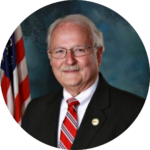
- Randall Walker, mayor of Perry and president of the Georgia Municipal Association. After a four-decade career in the energy industry, in 2019 Walker was elected mayor of Perry, home of Georgia National Fairgrounds & Agricenter, which hosts huge agricultural events and draws a million visitors a year. Walker set about revitalizing Perry’s downtown area and stepped up his involvement in statewide politics. Last year he helped lead opposition to a bill that would bar local governments from regulating housing standards, such as lot sizes and roof designs. Facing pushback from the Home Builders Association of Georgia and the Georgia Chamber, which argued that excessive regulation is stifling construction of affordable housing, Walker and other mayors in the municipal association, which represents 537 cities in Georgia, held the line, and the bill didn’t pass.

- The Rev. Bernice King, youngest daughter of Martin Luther King Jr. and chief executive officer of The Martin Luther King Jr. Center for Nonviolent Social Change. Ever since she was photographed at the age of 5 at her famous father’s funeral, Bernice King has been in the world spotlight. Now 60, Martin Luther King’s youngest child continues her family legacy. The influential minister and lawyer not only heads the King Center but also is involved in numerous human rights issues that take her around the globe as a thought leader and strategist. And when she makes a phone call, people answer.

- Lauren Curry, Gov. Kemp’s chief of staff, has the ear of the state’s most powerful politician. She is the first woman in Georgia history to hold the position, and as such she manages the governor’s time, agenda, message, administration and the unexpected. Curry is well acquainted with Georgia’s state government and how it works, having served in top positions in a half-dozen state agencies. The experience Curry gained as press aide to former Gov. Sonny Perdue should benefit Kemp as well.

- Stephen Lawson, a veteran GOP strategist, is a senior adviser to House Speaker Jon Burns and has been handling his external communications and strategic messaging since December. Lawson has already helped Burns to trumpet his support of income and property tax breaks and to thread the needle of supporting GOP lawmakers’ exploration of Medicaid expansion while also saying Kemp’s more limited Medicaid plan should be given time to work. Lawson maintains his partnership at Full Focus Communications, the public affairs communications firm he runs with Cody Hall, a longtime deputy and political adviser to Kemp. Lawson has worked on the campaigns of Florida Govs. Rick Scott and Ron DeSantis, Georgia Agriculture Commissioner Tyler Harper, Lt. Gov. Burt Jones and Congressman Mike Collins. In 2020, he was deputy campaign manager for former U.S. Sen. Kelly Loeffler, who narrowly lost in a runoff to U.S. Sen. Raphael Warnock.

- Chris Womack is CEO of Southern Company, one of the largest energy providers in the United States, with substantial operations in Georgia. Womack oversees a company that employs thousands of Georgians and plays a crucial role in powering the state’s economy. The decisions and strategies he implements directly impact the energy landscape, infrastructure development and job creation within Georgia. Womack’s connections and involvement in political circles allow him to shape energy policies and regulations that affect the state’s energy sector and broader economic interests. His leadership in promoting sustainable energy solutions and addressing environmental concerns positions him as a key player in Georgia’s transition to a more sustainable and resilient energy future.

- Michael Thurmond, CEO of DeKalb County, has faced unending queries from people wondering when he’ll run for governor. For now, the Clarke County-born Democrat and lawyer is focused on running DeKalb County, considered one of the Southeast’s most diverse counties. DeKalb is the only county in the state with an elected chief executive independent from the legislative branch. It’s a job Thurmond won in a landslide in 2016. Before that, he became the first Black elected to the Georgia General Assembly from Clarke County since Reconstruction. From there, he became the first African American elected to statewide office — labor commissioner — without prior appointment. Thurmond is widely regarded as a “turnaround expert,” having transformed the culture and enhancing operations of complex government agencies such as the Georgia Division of Family and Children Services, the Georgia Department of Labor and the DeKalb County School District. As labor commissioner, he was summoned to England to give his advice on workforce development. Other states regularly sought his advice as well.

- Fulton County Superior Court Judge Scott McAfee may determine the legal fate of many local and national politicians as well as the outcome of key state and national elections this year. The judge overseeing the election interference case against former President Donald Trump and 15 of his associates, a sprawling racketeering case alleging a criminal conspiracy to overturn the 2020 election, could send Trump to prison and summarily end his 2024 bid for the White House. Or McAfee could find the ex-president not guilty, a verdict that would act as jet fuel to Trump’s campaign. In the interim, he could find merit in charges by some defendants in the case that lead prosecutor Fani Willis has engaged in professional misconduct and disqualify her, diminishing the likelihood that Trump or his co-defendants (who include Trump’s former attorney Rudy Giuliani, former White House Chief of Staff Mark Meadows, former state Sen. Shawn Still, and former Georgia GOP chair David Shafer) ever have their day in court.

- U.S. Rep. Earl “Buddy” Carter is in his fifth term representing the 1st Congressional District in southeast Georgia. A member of the House Energy and Commerce Committee and the House Budget Committee, he has supported legislation to reduce emissions and increase U.S. energy production. A pharmacist, he supports legislation to improve the health care system and is co-sponsoring a bill to address Georgia’s high infant mortality rate. A champion of the Georgia ports and international trade since his days in the Statehouse, Carter this year won a $15 million federal grant to improve the Port of Brunswick and is leading a bipartisan effort in the Georgia congressional delegation to authorize a study to widen and deepen the harbor in the Port of Savannah. Carter is well known for his affable ways and bright personality. When he and U.S. Rep. Nikema Carter, an Atlanta Democrat, lost a bet with their Alabama colleagues over the winner of the Georgia vs. Alabama football game in December, the Pooler Republican donned a bright-red jacket and tie to hand-carry bags of Chick-fil-A sandwiches to the victorious ’Bama reps. He pops up regularly on national news and talk shows to offer pithy quips on D.C. doings. In January, after 15 rounds of voting for a new House speaker, he told WJCL-TV in Savannah: “Democracy is messy. … It’s almost as if we’re just wandering in the wilderness up here.”
Have questions? Contact Jill Jordan Sieder on X @journalistajill or at [email protected] and Tammy Joyner on X @lvjoyner or at [email protected].
And subscribe to State Affairs so you do not miss an update.
X @StateAffairsGA
Instagram@StateAffairsGA
Facebook @StateAffairsGA
LinkedIn @StateAffairs
Newly minted Senate Minority Leader Harold Jones II: ‘I’m not the typical back-slapping politician’
Nearly 10 years into legislative life, Sen. Harold Jones II wouldn’t change anything about the experience. “I love every minute of it. Even when I hate it, I love it,” the 55-year-old Augusta Democrat told State Affairs. Come January, Jones will add another role to his legislative duties: Senate minority leader, a job held for …
Gov. Kemp calls on state agencies to be fiscally restrained amid record $16.5B surplus
The Gist Gov. Brian Kemp asked the state’s 51 government agencies for continued fiscal restraint when drafting their amended fiscal year 2025 and 2026 budgets. Most agencies adhered to his request even as the state’s general fund surplus hit a record $16.5 billion last month. Forty-five agencies, excluding state courts, followed the governor’s instructions to …
Georgia defies bomb threats as election chief declares a “free, fair and fast” vote amid record turnout
ATLANTA – Despite dealing with over 60 bomb threats, Georgia’s election chief said Tuesday the state’s general election went smoothly. Georgia had a record turnout with nearly 5.3 million people voting, Secretary of State Brad Raffensperger told reporters. Election officials in the state’s 159 counties have until 5 p.m. to certify votes. “We had a …
In the (state)house: Meet the newest members of the Georgia legislature
When lawmakers reconvene at the state Capitol on Jan. 13, there’ll be a cadre of new faces in the 236-member Georgia General Assembly, one of the nation’s largest state legislatures. All 236 statehouse seats were up for election this year. Most candidates ran unopposed. Incumbents in contested races easily kept their seats, with the exception …



